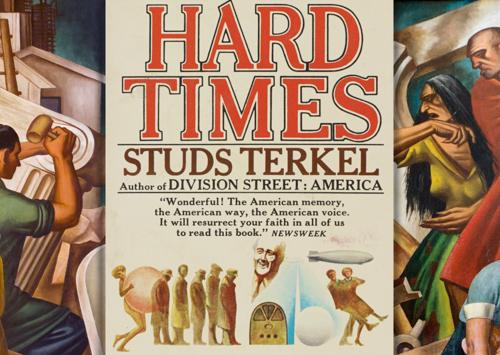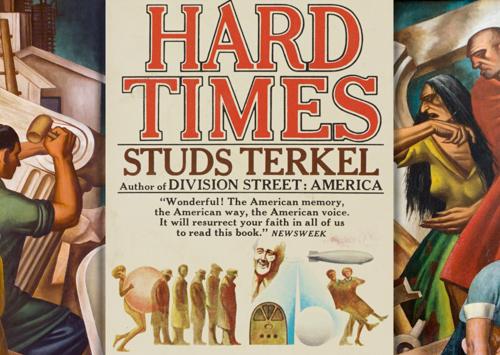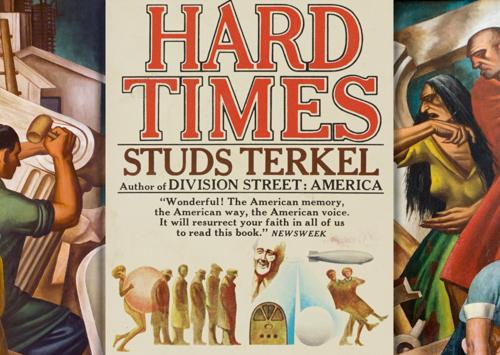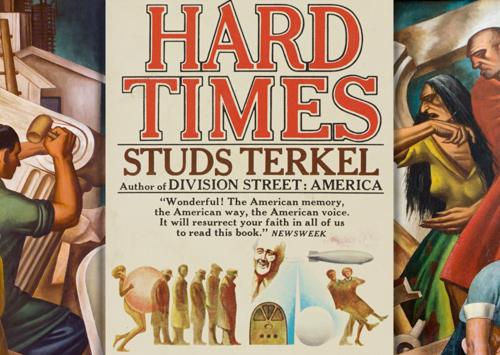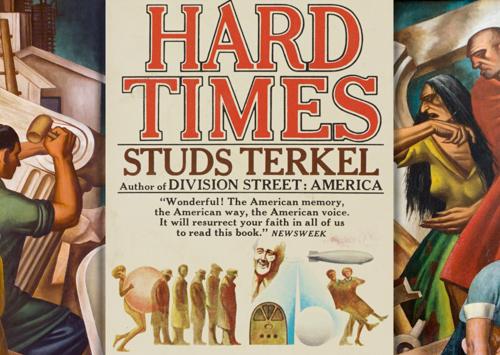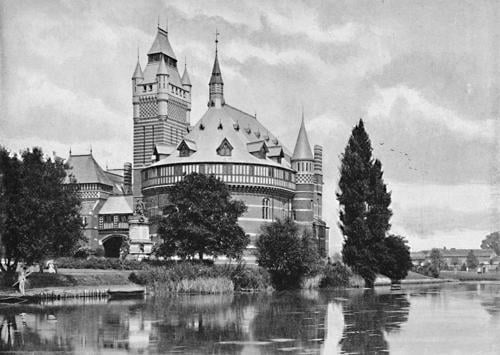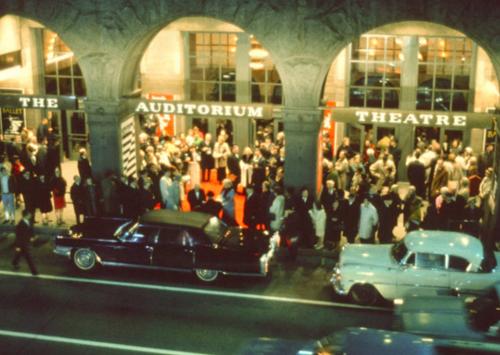Listen to New Voices on Studs Terkel our partnership with 826CHI-here! Read the Story
Showing 1 - 15 of 92 results
-
Win Stracke, Bill Adelman, and Bill Neebe discuss May Day and the Haymarket Square Riot
Apr. 29, 1976 Win Stracke, Bill Adelman, and Bill Neebe discusses the Haymarket Riot and the following trials and hangings which changed the labor movement around the world. The group discusses the American labor movement and police brutality that led to the protest and the eventual accusal of eight men. They also explore the roles George Pullman, Marshall Field, and the police force played and how they used the protest to weed out union leaders they did not like. The group briefly discusses the future of the labor movement.
-
Terkel comments and presents"Hard Times: an oral history of the great depression" ; part 3
May. 27, 1971 Presenting an award-winning summary program of "Hard Times: an oral history of the great depression" series 1971-72: "A gathering of survivors" (part two) with Jim Sheridan, Pauline Kael, Emma Tiller, Frank Czerwonka, Cesar Chavez, William Benton, Sidney Weinberg. Chapter 12.
-
Terkel comments and presents"Hard Times: an oral history of the great depression" ; part 2
May. 27, 1971 Presenting an award-winning summary program of "Hard Times: an oral history of the great depression" series 1971-72: "A gathering of survivors" (part two) with Jim Sheridan, Pauline Kael, Emma Tiller, Frank Czerwonka, Cesar Chavez, William Benton, Sidney Weinberg. Chapter 12.
-
Terkel comments and presents"Hard Times: an oral history of the great depression" ; part 1
May. 27, 1971 Presenting an award-winning summary program of "Hard Times: an oral history of the great depression" series 1971-72: "A gathering of survivors" (part two) with Jim Sheridan, Pauline Kael, Emma Tiller, Frank Czerwonka, Cesar Chavez, William Benton, Sidney Weinberg. Chapter 12.
-
Terkel comments and presents "Hard Times: an oral history of the great depression"; Program 9; Part 1
1971 Presenting "Hard Times: an oral history of the great depression": "Concerning The New Deal" with Ed Paulsen, Hank Oettinger, Gardner C. Means, Raymond Moley, Alf Landon, James A. Farley, C. B. Baldwin, Andy Kull, and John Beecher (program IX).
-
Terkel comments and presents "Hard Times: an Oral History of the Great Depression"; Chapter 3
1971 Presenting "Hard Times: An Oral History of the Great Depression" Chapter 3: Big Business & A Portrait of Two Women. William Benton credits Pepsodent's survival of the Great Depression to Amos 'n Andy. Arthur Robertson talks about the initial aftermath of the 1929 crash as a Wall Street businessman. Sidney Weinberg discusses the confusion on Wall Street after the crash and praises FDR's programs. Jimmy McPartland talks about the importance of working and the success of WPA to boost morale.
-
Terkel comments and presents "Hard Times: an Oral History of the Great Depression" ; Chapter 7
1971 Presenting "Hard Times: an Oral History of the Great Depression" High Life, Sixteen Ton: Chapter 7. Sally Rand talks about the creation of her signature fan dance and predictions for future depressions. Doc Graham discusses his upbringing, Chicago mobs, and Count Victor Lustig. Tony Soma talks about prohibition before and after the 1929 crash. Jerome Zerbe talks about inventing paparazzi photography, spending two weeks working in a coal mine, and the New Deal. Buddy Blankenship recalls working 16 hour days in West Virginia coal mines. Mary Owsley remembers life as a coal miner's wife.
-
Terkel comments and presents "Hard Times: an Oral History of the Great Depression" ; Chapter 7
1971 Presenting "Hard Times: an Oral History of the Great Depression" High Life, Sixteen Ton: Chapter 7. Sally Rand talks about the creation of her signature fan dance and predictions for future depressions. Doc Graham discusses his upbringing, Chicago mobs, and Count Victor Lustig. Tony Soma talks about prohibition before and after the 1929 crash. Jerome Zerbe talks about inventing paparazzi photography, spending 2 weeks working in a coal mine, and the New Deal. Buddy Blankenship recalls working 16 hour days in West Virginia coal mines. Mary Owsley remembers life as a coal miner's wife.
-
Studs Terkel discusses use of the drug Cylert (Pemoline) with Richard Kasperson and Robert Janicki of Abbott Labs
Feb. 23, 1976 Studs Terkel interviews two representatives from Abbott Laboratories: Richard Kasperson, V.P. of corporate regulatory affairs, and Dr. Robert Janicki, V.P. of corporate clinical research. The topic of conversation is the prescribed use of Cylert, which was a trade name for the drug Pemoline. Cylert was used to treat attention-deficit hyperactivity disorder (ADHD) and narcolepsy. Janicki and Kasperson respond to claims that the drug was overprescribed to school-aged children.
-
Studs Terkel discusses the changing role accents play on class distinctions in England with guests in the parlor of the Mayor in Stratford-upon-Avon ; part 2
1962 Studs Terkel gathers a cross section of opinions on accents and their changing role on class distinctions in British Society. He asks the Mayor and Mayoress of Stratford-upon-Avon, the Huxleys, their opinions on the influence of education on accents and class. Also present to offer opinions are Mr. & Mrs. Lawrence, pub owners from Lower Quinton near Stratford-on-Avon, and Mr. Morris, a London stockbroker and his wife. Bookending the conversation at the mayor's home are two conversations with Mr. and Mrs. Lawrence.
-
Studs Terkel discusses the Auditorium Theater with friends ; part 2
Jun. 1, 1967 Studs Terkel sits down with three guests who convey their memories of the Auditorium Theater in Chicago. Mary Garden, John Glickman and architect Harry Weese all agree that the theater's acoustics were extraordinary and there wasn't a bad seat in the house. Weese helped Chicago rediscover the Auditorium.
-
Stuart Brent discusses the demise of the independent bookseller
Mar. 31, 1980 Stuart Brent believes people are totally indifferent to reading. Brent has come to the realization that material rewards are more important than cultural activities and as a result, culture is dying. Brent is puzzled as to why readers would want to shop at big conglomerate stores like Kroch's and Brentano's when his store offers a personal, caring nature to its customers. There are two excerpts from Mrs. Dylan and Handasyde Buchanan, both from London, both independent booksellers.
-
Sterling "Red" Quinlan discusses the book "The Hundred Million Dollar Lunch"
Jul. 30, 1974 Mr Quinlan a pioneering Chicago TV executive and one time general manager of Chicago's ABC affiliate WBKB, discusses the book "The Hundred Million Dollar Lunch." Mr Quinlan and Studs converse about the trials against RKO General/General Tire, a struggle that lasted 15 years. Includes an excerpt of an interview with Denis Mitchell.
-
Sir George Bolton of Bank of London discusses British economic depression
Sep. 23, 1970 Sir George Bolton discusses how the 1929 American stock market crash affected international banking and investment and how economy and culture relate to each other.



